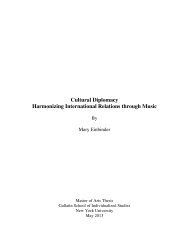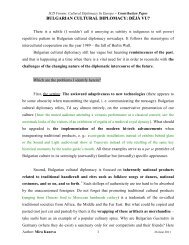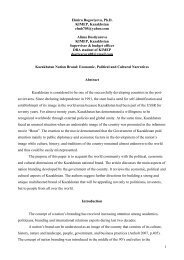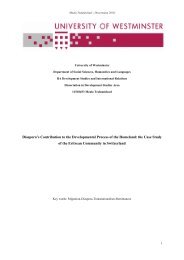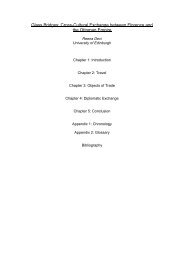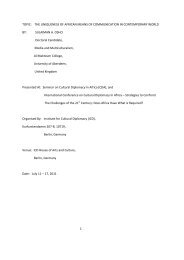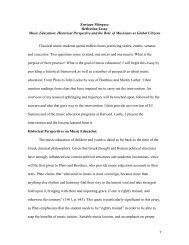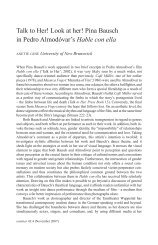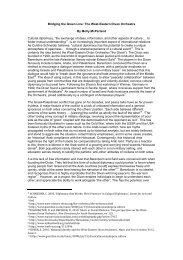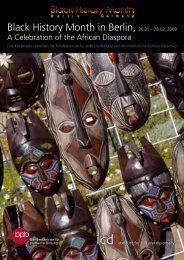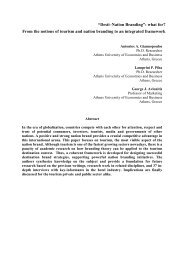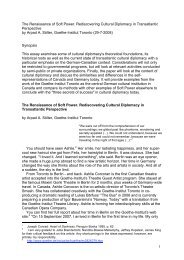Country Profiles: Germany - Institute for Cultural Diplomacy
Country Profiles: Germany - Institute for Cultural Diplomacy
Country Profiles: Germany - Institute for Cultural Diplomacy
You also want an ePaper? Increase the reach of your titles
YUMPU automatically turns print PDFs into web optimized ePapers that Google loves.
7.0 Application of <strong>Cultural</strong> <strong>Diplomacy</strong> in the Private Sector<br />
The following part of the report will consider programmes and organisations of the private<br />
sector, meaning organisations or programmes initiated or currently directed by private<br />
enterprises and businesses.<br />
7.1: Atelier Culture<br />
Agent of <strong>Cultural</strong> <strong>Diplomacy</strong>: Atelier Culture in cooperation with Wiesbadener Salon<br />
Agenda: Providing jobs <strong>for</strong> women with a history of migration who can profit from the<br />
intercultural environment, personally and financially<br />
Vehicle of <strong>Cultural</strong> <strong>Diplomacy</strong>: Inside: the work of the women with different migration<br />
histories; Outside: the work of the Atelier<br />
Target Audience: Inside: Women with a history of migration; Outside: Everyone who is<br />
interested in the work of the Atelier<br />
‘As much individuality as possible, as much cooperation as necessary’, this is the principle of a<br />
group of entrepreneurs in Wiesbaden of which Atelier Culture is the leading component. It<br />
started as a project Wiesbaden funded by the city of Wiesbaden, the state of Hessen and the<br />
European Union, in May 2009 which aimed principally to support women with a history of<br />
immigration. For several reasons, such as a lack of education or German language skills, their<br />
age or the non-recognition of their educational achievements, it is difficult <strong>for</strong> these women<br />
to find an adequate job.<br />
The sewing-cafe was supposed to be a place where these women could meet in an<br />
intercultural environment, exchange their ideas and help each other with their work.<br />
Eventually they had to present this work to a panel. It soon became clear that the project had a<br />
huge potential. At first, sixteen professional and young talented designers from <strong>Germany</strong>,<br />
Brazil, Marocco, Pakistan, Russia and Syria presented their work through the programme<br />
and convinced the jury and others of their talent. From then on the project did not need<br />
more funding. Today people can go to the atelier and use materials and machines <strong>for</strong> €7.50<br />
per hour. Furthermore, Atelier Culture offers sewing and stitching classes, organizes<br />
congresses and workshops. Rooms can also be rented to exhibit own creations, sewing<br />
machine entrepreneurs can be consulted. There is also a counselling service <strong>for</strong> those who<br />
want to get their own enterprise running.<br />
Anke Trischler, the head of the initiative worked <strong>for</strong> several large companies, in leading<br />
positions and it was she who pioneered the project. 100 In 2010 Atelier Culture was named one<br />
of the “Selected Places” (Ausgewählte Orte) of the German initiative <strong>Germany</strong> – the <strong>Country</strong><br />
of Ideas‚ (Deutschland- Land der Ideen). 101 For the prize giving ceremony Atelier Culture had<br />
an ambitious plan. It tried to create a ‛cultural carpet‚ composed of 365 single carpets <strong>for</strong><br />
every place honoured by the initiative. In the end the atelier ‘only‛ finished 200 and the<br />
best of them were shown at the IHK building where the ceremony was held.<br />
The different nationalities working at Atelier Culture and the cultural diversity represented by<br />
clothes makes the project a good example of integration and cultural diplomacy in German<br />
society.



